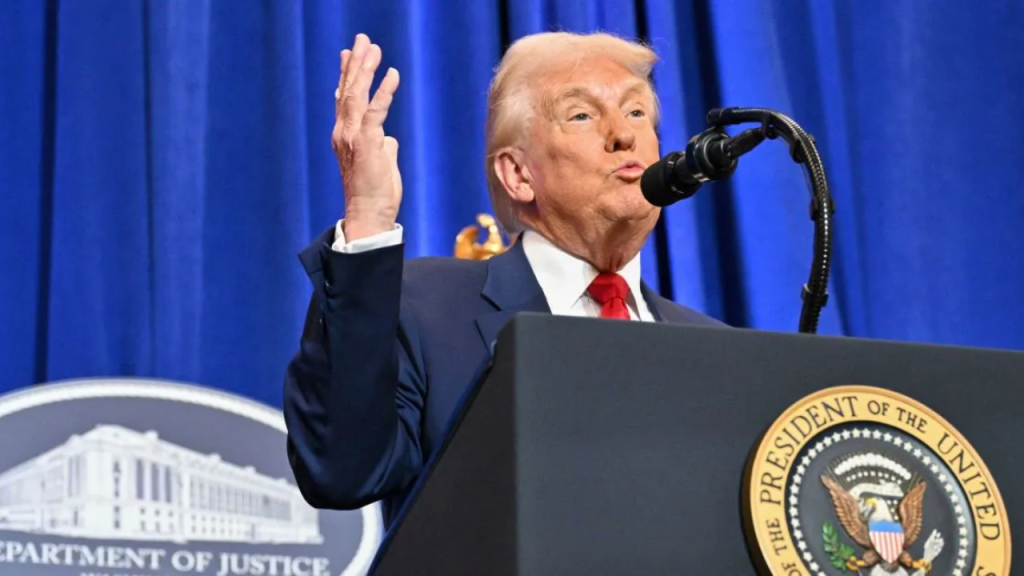
Donald Trump’s so-called “presidential payback tour” is escalating — and this time, it’s personal. While it’s already deeply concerning that he’s gone after major law firms, universities, and media houses, he’s now shifting focus to individual private citizens.
Using the power of the presidency, Trump is trying to punish former federal officials who dared to speak out against him — and possibly put them behind bars.
In a pair of official announcements, complete with White House logos and formal fonts, Trump singled out two people who served under his first administration: Chris Krebs and Miles Taylor. Their crime? Publicly criticizing Trump’s false claims and decisions.
Chris Krebs was the head of the Cybersecurity and Infrastructure Security Agency from 2018 to 2020. He made headlines when he publicly stated that the 2020 election was secure, directly challenging Trump’s false narrative about election fraud.
For that, Trump now calls him a “significant bad-faith actor” and claims he poses a “risk” to the public, although he provides no evidence.
The second target is Miles Taylor, a former official at the Department of Homeland Security. Taylor criticized Trump through anonymous publications and media appearances.
Trump calls him a “bad-faith actor” too, saying he spread division. Again, no evidence is provided — just labels.
This isn’t just political theater anymore. Trump has ordered that both Krebs and Taylor be stripped of any government security clearance — and not just them, but also anyone who works with them.
That includes Krebs’ private cybersecurity firm and Taylor’s team at the University of Pennsylvania. Trump is punishing their entire workplaces for daring to be associated with them. Freedom of association? That doesn’t matter here.
And it gets even more serious.
Trump has also instructed the attorney general, currently Pam Bondi, to open criminal investigations into both Krebs and Taylor. What for?
That remains unclear. The official orders don’t mention any specific laws being broken. There’s no crime in disagreeing with the president, telling the truth, or “stoking dissension.” Yet these are the reasons Trump is using to push for criminal inquiries.
Normally, an attorney general must have “predication” — some basic evidence that a crime may have occurred — before launching an investigation.
This standard exists to prevent exactly the kind of abuse we’re seeing here: using the justice system to settle personal scores.
Even Bill Barr, Trump’s former attorney general and no stranger to controversy, often ignored Trump’s public demands to arrest political rivals like Barack Obama and Joe Biden. He saw those outbursts for what they were: political tantrums.
But Pam Bondi is no Bill Barr — and that might be a bad thing. She has already shown a willingness to do whatever Trump wants.
For example, in the Signal messaging app scandal, where some officials may have acted recklessly with military secrets, Bondi refused to even investigate. She declared, with no proof and no inquiry, that nothing illegal happened. End of story.
Now, the big question is: will Bondi go further than Barr ever did and weaponize the Justice Department purely to satisfy Trump?
Even if no charges are ultimately filed, just being under criminal investigation is a nightmare. Phones get seized. Friends and colleagues get dragged into legal battles.
Legal fees pile up. Reputations are damaged. Personal relationships suffer. Ask anyone who’s been investigated — even if they weren’t charged — and they’ll tell you how painful the process is.
And ironically, if Bondi does move forward with charges, Krebs and Taylor might actually have a strong legal defense: selective prosecution.
That means they were targeted not for breaking the law, but for who they are and what they said. Usually, this kind of defense is hard to prove because prosecutors rarely put their bad intentions in writing.
But This Case Is Different
Trump’s memos — signed, sealed, and stamped on White House letterhead — clearly show personal and political motivations behind the investigations. That kind of evidence is rare and powerful. A judge could very well decide that the prosecutions are invalid from the start.
For years, Trump has talked about jailing his critics, often through angry social media posts or campaign rants. Most people wrote it off as bluster — just part of his personality.
But now, he’s made it official policy. It’s written down. It’s sent to the attorney general. And it looks like Bondi may actually follow through.
The Danger Is Real.
This isn’t just about two former officials anymore. It’s about using government power to threaten anyone who speaks up — a move that puts America’s justice system and free speech principles at serious risk.
